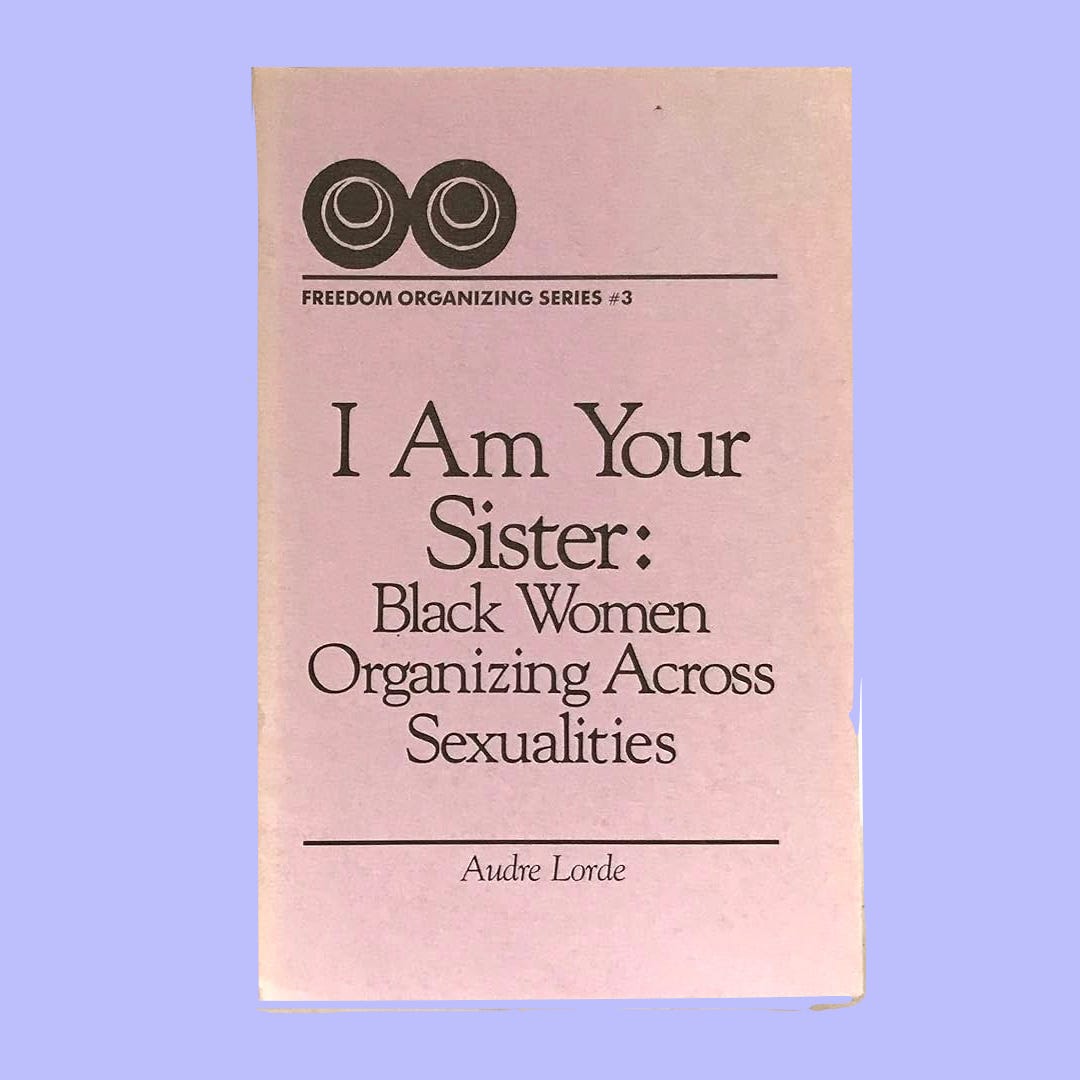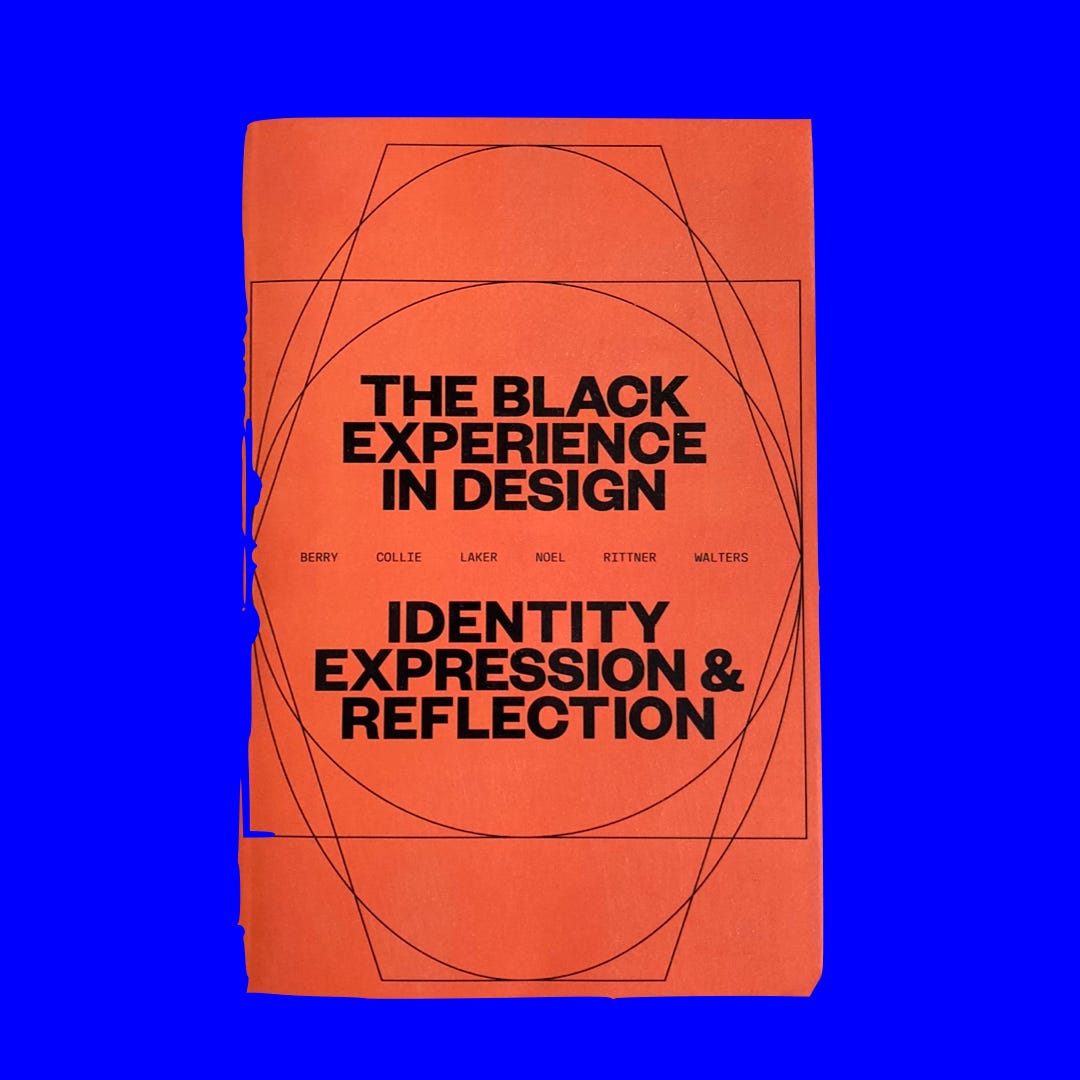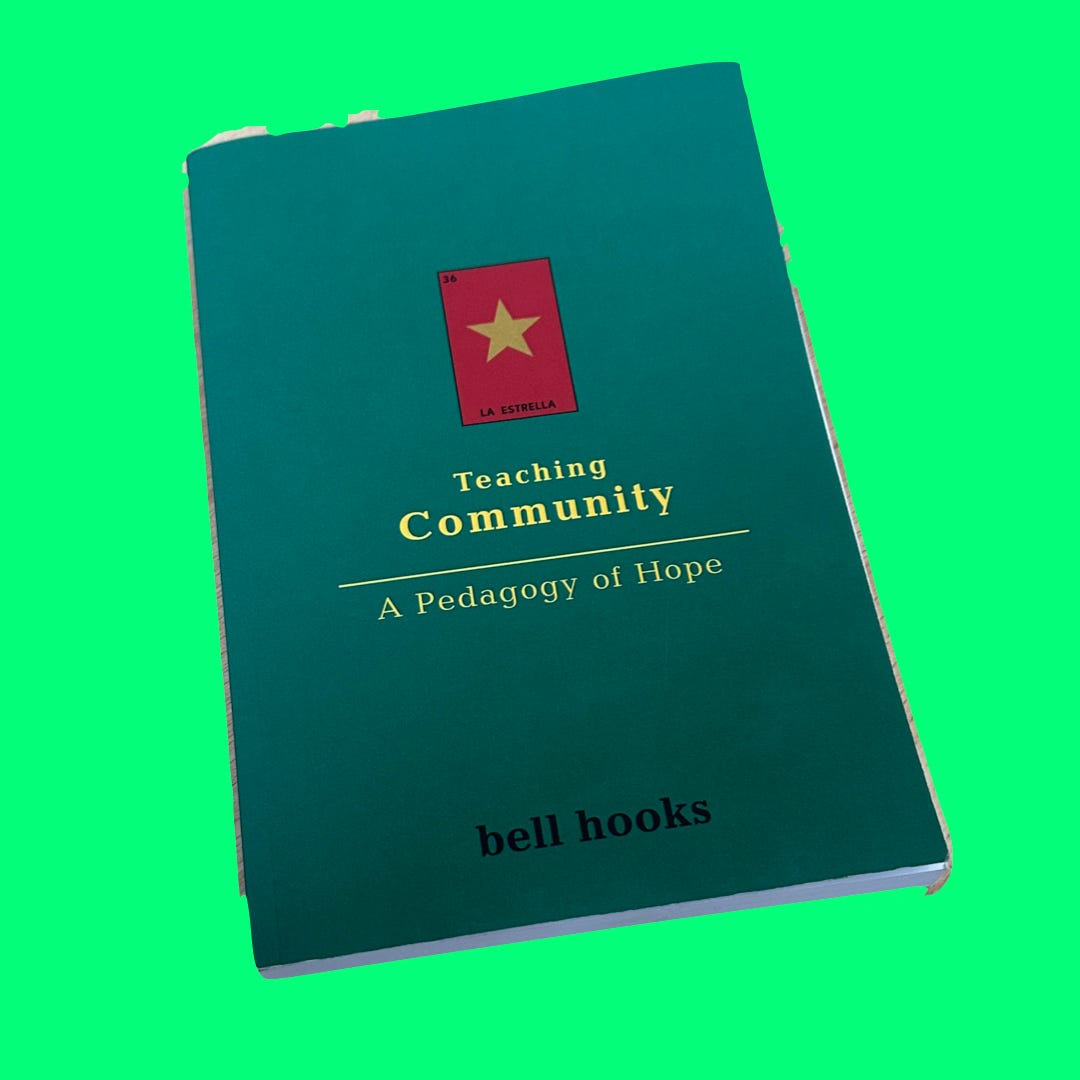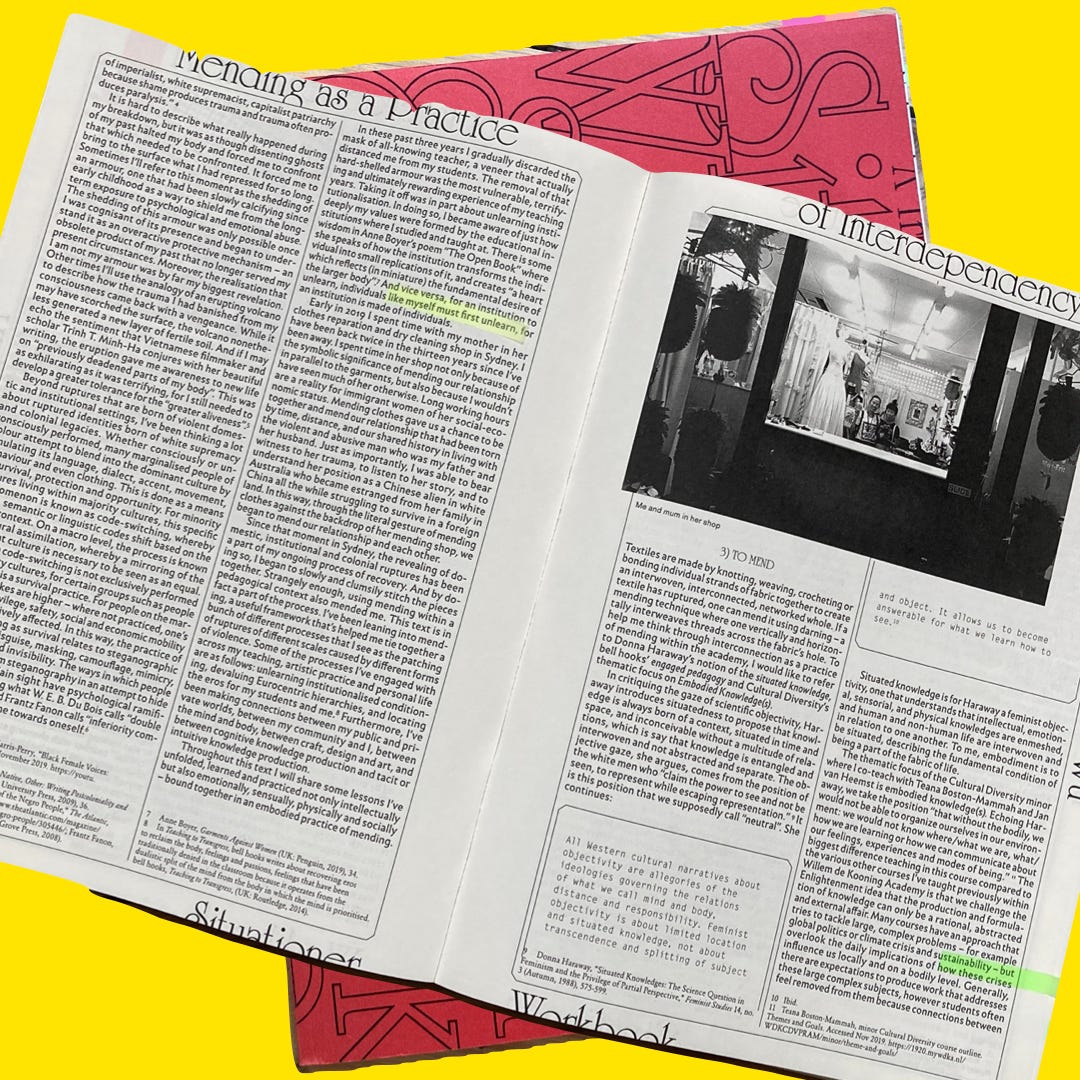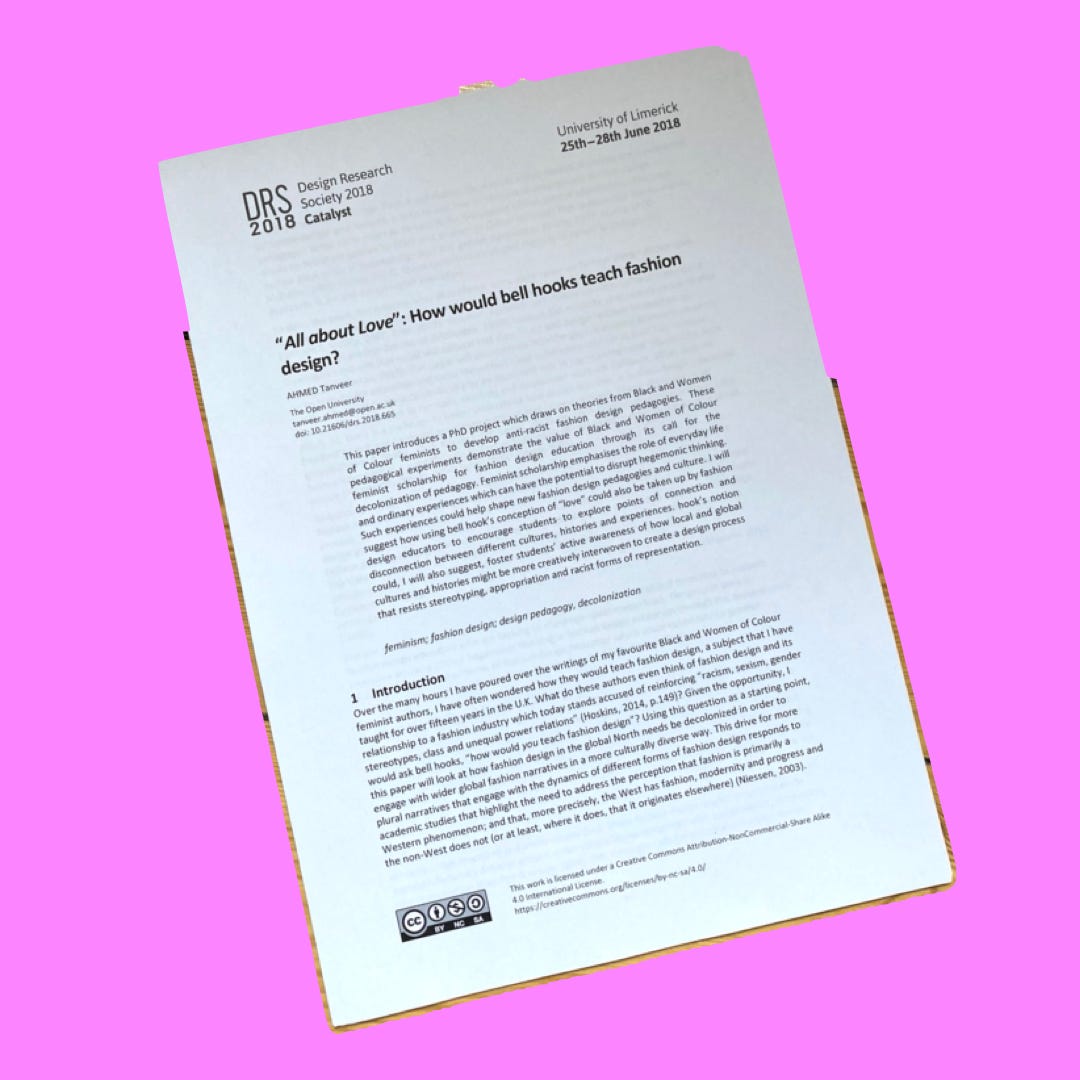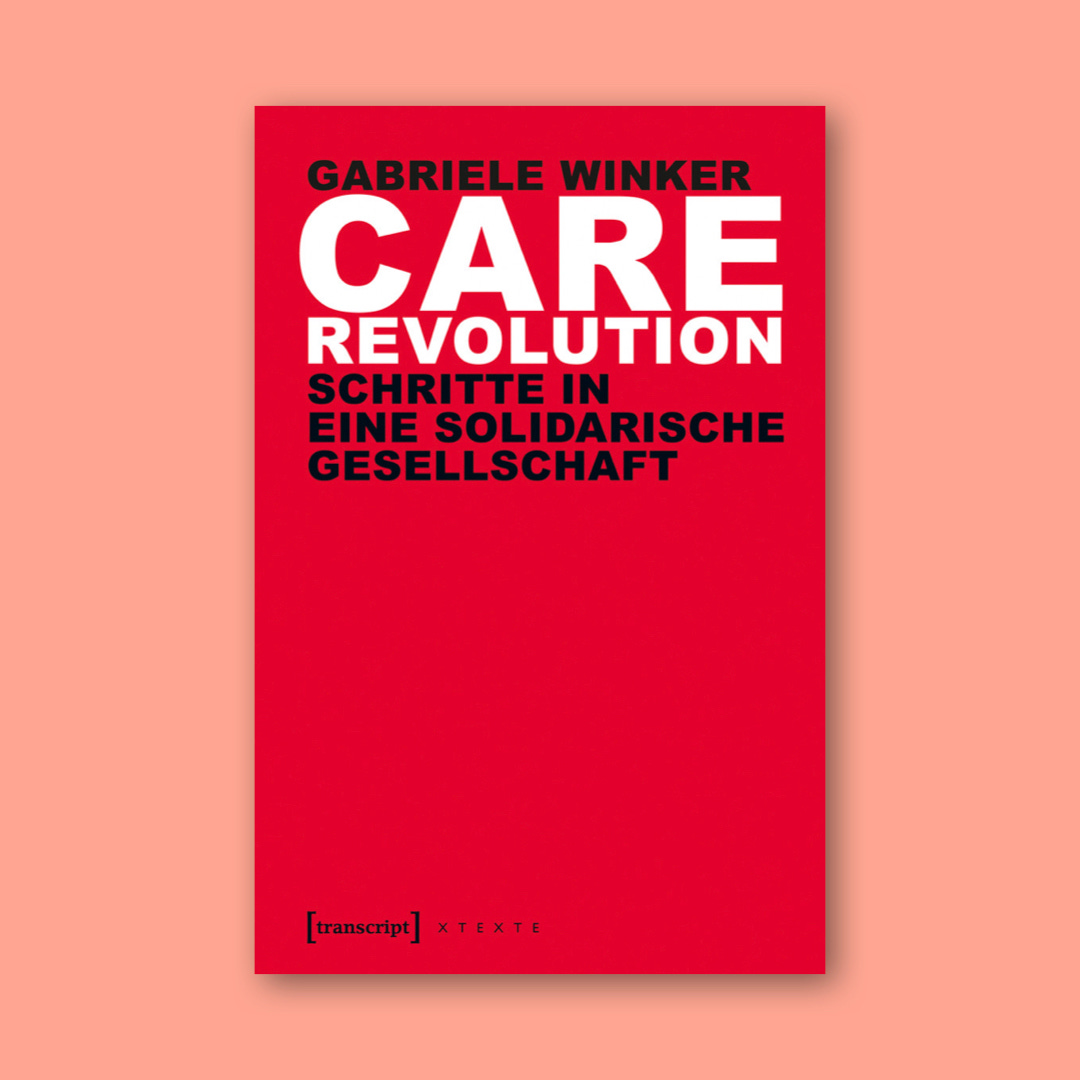Dear design teachers/learners and bibliography-lovers,
thanks for subscribing (or staying subscribed) to this mailing list and following the research project!
This newsletter edition #8 is curated in collaboration with Mawuto Dotou (@smawuto) and was inspired by their exhibition Conscious and Collective Love, which was on view at the MKG Hamburg from 3.5.–21.7.2024. The exhibition, a result of their residency, brought together over 40 individuals from diverse creative, geographical, queer and class backgrounds, manifesting in a variety of photographies, installations and short movies.
Central to the exhibition was an open book table, thoughtfully assembled by Dotou alongside Buchhandlung im Schanzenviertel and MKG Freiraum. The carefully selected literature explored themes of community, solidarity, justice, societal support and non-romantic love concepts. These literary works shaped the residency's essence – serving as a catalyst for connection, dismantling hierarchies, and allowing collective love and care to guide the creative process. Visitors experienced collaboration not merely as a methodology, but as an ongoing practice of creating space for one another. The book collection has now found a permanent home at MKG Freiraum, where it remains accessible to the public.
Dotou's artistic practice amplifies the voices of various communities while demonstrating how co-organizing, resource exchange, and cross-disciplinary creativity can yield compelling artworks and establish lasting resources for underrepresented groups.
As a freelance communication designer, Mawuto teaches Corporate Design at Designschule Schwerin and co-hosts Ladies, Wine & Design Hamburg – a salon night uniting female, trans, and non-binary creatives.
Their engagement with political and social movements has fueled an exploration of critical design literature, leading to an ongoing intersectional research journey. Throughout the past year, they have contributed to editorial projects like narratif while conducting workshops and guest lectures at Design Zentrum Hamburg, HfbK Hamburg, KiSD, and UdK Berlin.
Currently, Mawuto collaborates with 15 fellow creatives on designgewerkschaft, a collective dedicated to improving working conditions in the creative sector.
Lots of 💜
Mawuto and Lisa
Added to the bibliography
hooks, bell (2001): All About Love – New Visions. New York, Harper Collins. First published in 1999.
»Embracing a love ethic means that we utilize all the dimensions of love–care, commitment, trust, responsibility, respect, and knowledge‹ in our everyday lives. We can successfully do this only by cultivating awareness. Being aware enables us to critically examine our actions to see what is needed so that we can give care, be responsible, show respect, and indicate a willingness to learn.« (p. 94)
Lorde, Audre (1985): I Am Your Sister: Black Women organizing across sexualities. Kitchen Table. New York: Women of Color Press. First published 1985.
» [...] Well, I do not want to be tolerated, nor misnamed, I want to be recognized. I am a Black Lesbian, and I am your sister.« (p. 8)
→ Accessible here.
Berry, Anne H.; Collie, Kareem; Laker, Penina Acayo; Noel, Lesley-Ann; Rittner, Jennifer; and Walters, Kelly (2022): The Black Experience in Design – Identity, Expression & Reflection. New York: Allworth Press.
The Black Experience in Design brought forward so many stories of resilience, identity, and collaboration. It served as a reminder of the richness that comes from centering voices and practices that often get overlooked, which was a huge part of the approach to the exhibition Conscious and Collective Love.
hooks, bell (2004): Teaching Community: A Pedagogy of Hope. New York: Routledge. First published 2003.
Teaching Community by bell hooks encourages thinking about how learning spaces can also be spaces of care, solidarity, and connection. That idea of creating a space where people can share knowledge, skills, and stories directly influenced the residency, pushing us to design a process where everyone had something to contribute and learn.
»To counter this distorted approach to inclusion and diversity, democratic educators have stressed the value of pluralism. In the essay “Commitment and Openness: A Contemplative Approach to Pluralism,” Judith Simmer-Brown explains: “pluralism is not diversity. Diversity is a fact of modern life—especially in America. There are tremendous differences in our communities—ethnically, racially, religiously. Diversity suggests the fact of such differences. Pluralism, on the other hand, is a response to the fact of diversity. In pluralism, we commit to engage with the other person or the other community. Pluralism is a commitment to communicate with and relate to the larger world—with a very different neighbor, or a distant community.” Many educators embrace the notion of diversity while resisting pluralism or any other thinking that suggests that they should no longer uphold dominator culture.« (p. 47)
Wu, Amy Suo (2021): Mending as a Practice of Interdependency. In: Teran, Michelle; Monk, Johanna; Boston-Mammah, Teana & Edwards, Clementine (2021): Situationer Workbook/ Situationer Cookbook. Rotterdam: Willem de Kooning Academy, p. 30–41.
»In the design educational context where abstractions were valued, I felt that embodied knowledge had no place in my work. That is why feel a personal obligation as a practice teacher working in ›Cultural Diversity‹ to begin where the senses begin – that is, in our bodies – by interrogating how the body organises our knowing, feeling and being, and by extension how that shapes our understanding of the way we gaze on our own bodies and those of others.
[…]
Another way of looking at embodiment is through bell hooks' engaged pedagogy – an understanding of wholeness that places importance on the relationship between the teacher and students as well as on the interconnection between mind, body and spirit. This kind of pedagogy approaches the student as a ›whole‹ human being striving for intellectual and creative nourishment as well as knowledge on how to live in the world. It emphasises wellbeing; students and teachers alike wish to heal and grow, and they are empowered by the process.« (p. 34)
Ahmed, Tanveer (2018): All about Love – How would bell hooks teach fashion design? In: Storni, Cristiano; Leahy, Keelin; McMahon, Muireann; Lloyd, Peter & Bohemia, Erik (eds.): Design as a catalyst for change – DRS International Conference, 25.–28.6.2018, Limerick, Ireland, p. 541–551.
»hook’s notion of love also has the potential to be utilised to foster students’ active awareness of how local and global cultures and histories might be more creatively interwoven, to create a design process that resists stereotyping, appropriation and racist forms of representation. Adopting this approach in fashion design education, instead of abstract ahistorical approaches, orients educational experiences on historical and biographical specificities and differences. This approach could therefore provide points of disconnect between communities as well as connections.« (p. 547)
→ Accessed the paper here.
Winker, Gabriele (2015): Care Revolution – Schritte in eine solidarische Gesellschaft. Bielefeld: Transcript Verlag.
»Mit dem Begriff der Care Revolution bezeichne ich eine Transformationsstrategie, die zeitliche und materielle Ressourcen für Selbstsorge und Sorge für andere und damit menschliche Bedürfnisse konsequent ins Zentrum der Politik stellt. Ich erläutere einzelne Schritte einer solchen Care Revolution. Dabei geht es darum, dass alle Menschen die Möglichkeit erhalten, ihre Bedürfnisse zu befriedigen und ihre Fähigkeiten in vielen Lebensbereichen jenseits des dominanten Leistungsprinzips zu entfalten. Dieses Ziel einer solidarischen Gesellschaft skizziere ich als konkrete Utopie, die sich auf jetzt schon vorhandene Möglichkeiten und reale Akteur_innen bezieht.« (p. 14)
ongoing Open Call
We invite contributions from you; design educators, students, alumni, researchers, pedagoges, enthusiasts and others to submit and share the sources which are reference points and/or inspiration to your practice! Your contribution will be published in our infrequent newsletter and in our text-based bibliography.
→ Find out how to contribute here.
Info
Teaching Design started as a collectively gathered bibliography focusing on design education from intersectional feminist and decolonial perspectives. Since its launch in September 2019, it has expanded into conversational formats, workshops, a temporary library and a space for reflections, which all has led to the platform in its current form.
→ Learn more about the research project here.
Currently the bibliography as well as this newsletter is curated and edited by Lisa Baumgarten unless mentioned otherwise.





